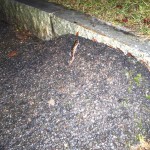“I learned this, at least, by my experiment; that if one advances confidently in the direction of his dreams, and endeavors to live the life which he has imagined, he will meet with a success unexpected in common hours. He will put some things behind, will pass an invisible boundary; new, universal, more liberal laws will begin to establish themselves around and within him; or the old laws be expanded, and interpreted in his favor in a more liberal sense, and he will live with the license of a higher order or beings. In proportion as he simplifies his life, the laws of the universe will appear less complex, and solitude will not be solitude, nor poverty poverty, nor weakness weakness. If you have built castles in the air, your work need not be lost; that is where they should be. Now put the foundations under them” (Thoreau, 351-352).
This passage truly seems a fitting part of the conclusion to Walden. It is oddly inspirational for Thoreau, but I definitely appreciate this. He sums up what he has learned from this experiment and advocates for the pursuing of dreams in order to exist in a greater place with one’s self and within the world. I especially like the final two lines where he mentions castles and their foundations. He states that dreams and works should be of a high value, beyond the reach of the earth, such that one can then further the dreams and continue to support them or provide a foundation.
“However mean your life is, meet it and live it; do not shun it and call it hard names. It is not so bad as you are. It looks poorest when you are richest. The fault-finder will find faults even in paradise. Love your life, poor as it is. You may perhaps have some pleasant, thrilling, glorious hours, even in a poor-house. The setting sun is reflected from the windows of the alms-house as brightly as from the rich man’s abode; the snow melts before its door as early in the spring. I do not see but a quiet mind may live as contentedly there, and have as cheering thoughts, as in a palace. The town’s poor seem to me often to live the most independent lives of any” (Thoreau, 356).
This passage takes all of Thoreau’s experiences and information from his days of simplicity, connecting with the world around him, and presents it as a generally positive outlook on life. He lived a life of simplicity during his time in Walden and felt the true richness of his life, despite the simplicity of it all. He offers a sense of encouragement in this passage to consider that all humans are equals and may justly enjoy life equally. The simple elements of life, like the seasons and sunshine, are the same for everyone. Those that are poorer merely have less belongings to bother with, just as he did. There are many more things of greater importance in life than wealth.

